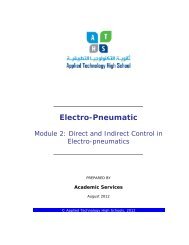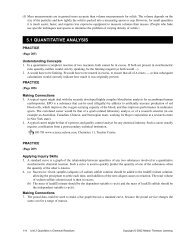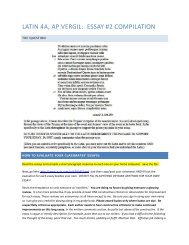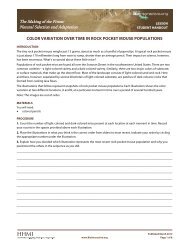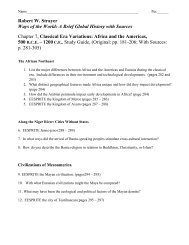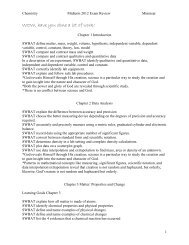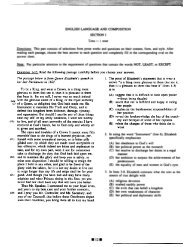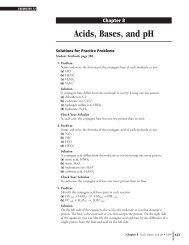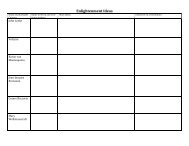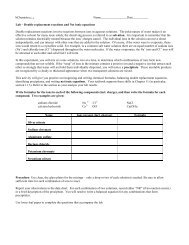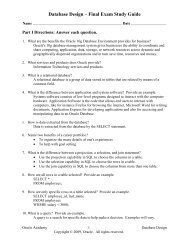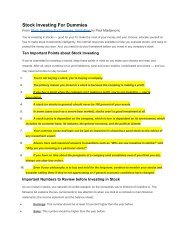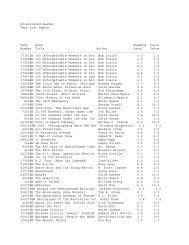Santa Barbara Community College - Quia
Santa Barbara Community College - Quia
Santa Barbara Community College - Quia
Create successful ePaper yourself
Turn your PDF publications into a flip-book with our unique Google optimized e-Paper software.
CATESOL Conference ‘06<br />
San Francisco, CA<br />
© Jack Bailey baileyj@sbcc.edu &<br />
Marit ter Mate-Martinsen martinse@sbcc.edu<br />
Table of Contents:<br />
Backs to the Screen<br />
Check Homework<br />
Classroom Interviews<br />
Comic Descriptions<br />
Corner Conversations<br />
Crossword Puzzle<br />
Dictation<br />
Dictation Relays<br />
Find a Partner<br />
Find Someone Who<br />
Find the Mistake<br />
Gameboard<br />
Give One, Get One<br />
Grammar Conversations<br />
Group Quiz<br />
Hangman<br />
Human Bingo<br />
Idioms in Context<br />
Irregular Verb Relay<br />
Jokes<br />
Line-Ups<br />
Look Again Pictures<br />
Matching<br />
Meet Someone New<br />
Mingle<br />
Mystery Bag: 20 Questions!<br />
Newspaper Gallery<br />
Odd One Out<br />
One Change<br />
One-minute Speech<br />
Partner or Small Group Conversation<br />
Picture Recall<br />
Picture Story<br />
Proverbs<br />
Question of the Day<br />
Quick Talk<br />
Read<br />
Riddles<br />
Round Robin<br />
Songs<br />
Survivor<br />
Three things you learned last week<br />
Tongue Twisters<br />
Treasure Share<br />
True or False TPR<br />
Two truths and a Lie<br />
Vocabulary Dice Game<br />
Who am I?<br />
Word/ Sentence Scramble<br />
Word Search
© Jack Bailey baileyj@sbcc.edu &<br />
Marit ter Mate-Martinsen martinse@sbcc.edu<br />
Class Starters<br />
What are they?<br />
• Each activity can be completed easily in five to fifteen minutes.<br />
• Late arriving students can easily join in.<br />
• Activities are fun rewarding and educational.<br />
Why do them?<br />
• Reward and don't punish students who come to class on time.<br />
• Encourage punctuality.<br />
• Value student time.<br />
• “I can’t start because there aren’t enough students in class yet,” is not an<br />
acceptable excuse to begin class late. Begin on time with a class starter, so<br />
students are immediately stimulated and ready to learn!<br />
50 Example Class Starters<br />
Title Backs to the Screen<br />
Materials • Short video clip of one to 3 minutes.<br />
Procedure 1) Pre-teach key words and phrases that students will need to describe<br />
what you will show them.<br />
2) Put students in pairs and have them self-assign “A” and “B” students<br />
3) Student A stands or sits with his/her back to the screen. Student B<br />
faces A and the screen.<br />
4) Play a video clip w/o sound.<br />
5) B talks non-stop describing to A what is taking place on the screen.<br />
Encourage students to use as much detail as possible.<br />
6) After a minute or so, stop the video and have students switch places.<br />
7) Continue the video while A now describes the action.<br />
8) After both students have described part of the video, replay the clip<br />
w/o sound for all to see.<br />
9) Replay the clip with sound.<br />
Title Check Homework & Homework Reward (Appendix A)<br />
Materials • Homework that needs to be checked.<br />
Procedure 1) Check homework.<br />
Variation • Give students a homework paper at the beginning of the term. When<br />
you check students’ homework, ask them to put their “homework<br />
paper” on their desks. If a student did his/her homework, sign/stamp<br />
or place a sticker on the homework paper. While checking student<br />
2
© Jack Bailey baileyj@sbcc.edu &<br />
Marit ter Mate-Martinsen martinse@sbcc.edu<br />
homework, students could do a journal entry and/or compare their<br />
homework.<br />
Title Classroom Interviews (Appendix B)<br />
Materials • Half sheet with 4 questions and space for students to write<br />
responses.<br />
Procedure 1) Give each student a “classroom interview” handout<br />
2) Go over the directions and questions<br />
3) Do an example classroom interview<br />
4) Tell students to stand up, walk around the room and interview 4<br />
people.<br />
5) Elicit from a few students what they learned during the interview.<br />
Title Comic Descriptions (Appendix C)<br />
Materials • Humorous comic strips contain little or no text.<br />
Procedure 1) In pairs, one student has their back to the front of the room while the<br />
other student describes the contents of a comic strip as it is revealed<br />
by the instructor.<br />
2) Pre-teach important vocabulary as necessary.<br />
Title Corner conversations<br />
Materials • 4 posters with topics/ questions (e.g., fall, winter, spring and summer)<br />
Procedure 1) Place a poster in each corner of the room.<br />
2) Explain that students will have conversations about different topics.<br />
3) They should choose the topic they would like to talk about first and<br />
stand in that corner of the room.<br />
4) Students in the same corner of the room should have a conversation<br />
about their topic.<br />
5) Give a sign that students have to change corners to have a different<br />
conversation with other students about a new topic.<br />
6) Repeat step 4.<br />
Title Crossword Puzzle (Appendix D)<br />
Materials • To create a crossword puzzle, go to http://school.discovery.com <br />
custom classroom puzzlemaker criss-cross puzzle (takes about<br />
10 minutes total! Register for free first)<br />
Procedure 1) Give each pair/ small group 1 copy of the crossword puzzle.<br />
2) Go over the directions together (it is important for students to know<br />
the difference between “down” and “across.”)<br />
3) Do one together (optional).<br />
4) Tell the class it’s a race: which pair/ group can solve the puzzle the<br />
3
© Jack Bailey baileyj@sbcc.edu &<br />
Marit ter Mate-Martinsen martinse@sbcc.edu<br />
quickest?<br />
5) Go over answers and award winners with a prize.<br />
Title Dictation<br />
Materials • Paper and pen (optional)<br />
Procedure<br />
1) Read words or a sentence to students<br />
2) Ask students to exchange their paper with a partner to correct the<br />
answers<br />
Variation • You could also have students compare their answers with each other<br />
and write the answers on the board to review accurate spelling.<br />
• The dictation could be a short quiz as well.<br />
• Give students a blank bingo paper. They should write each word they<br />
hear in a different box. Play a short bingo game. The winner should<br />
also have the correct spelling!<br />
• Have students draw a tic-tac-toe grid. They should write each word<br />
they hear in a different cell. Go over the answers. For each correct<br />
answer, students should put an X in the cell. For each incorrect<br />
answer they should place an O. If students have three X’s, they win a<br />
prize.<br />
Title Dictation Relays<br />
Materials • Dictation sentences formatted for relay<br />
Procedure 1) Students are divided into pairs.<br />
2) One member of each pair (A) is asked to come to the front of the room<br />
while the other member (B) remains at a desk at the back of the room.<br />
3) The A partners are asked to read the first portion of a dictation posted<br />
on the front wall.<br />
4) The A partners must then walk to the back of the room and dictate<br />
what they can to their partner- no yelling!<br />
5) Half way through the posted dictation, the partners should switch roles<br />
until the dictation is finished.<br />
Title Find a Partner<br />
Materials • Index cards with vocabulary and definitions<br />
Procedure<br />
1) Give each student an index card.<br />
2) They should first decide if it is a vocabulary word or meaning.<br />
3) Have students roam around the room to find their partners.<br />
Variation • Once partners have found each other, have them sit with each other.<br />
Each pair should stand up to reveal their vocabulary word and<br />
definition. The class decides if it is a correct match by giving it a<br />
“thumbs up” or “thumbs down.”<br />
4
© Jack Bailey baileyj@sbcc.edu &<br />
Marit ter Mate-Martinsen martinse@sbcc.edu<br />
Title Find Someone Who (Appendix E)<br />
Materials • Worksheet (Worksheet asks them to, “Find someone who…<br />
Ate eggs for breakfast.<br />
Took the bus to school.<br />
Saw a movie last weekend.<br />
----<br />
Has been to Disneyland.<br />
Has eaten escargot.<br />
----<br />
Has climbed a mountain.<br />
Has washed dishes this week.<br />
Has planted a garden.)<br />
Procedure 1) Hand each student a find someone who worksheet.<br />
2) Go over the directions and do an example first.<br />
3) Have students roam around room finding other students to complete<br />
their worksheets.<br />
4) Students work until worksheet is complete or time is called.<br />
Variation • Targeted Pronunciation.<br />
• Targeted verb tenses.<br />
• Icebreaker / Way to learn names.<br />
Title Find the Mistake<br />
Materials • Sentences with mistakes<br />
Procedure<br />
1) Individually, in pairs or in groups, have students identify mistakes in<br />
sentences.<br />
2) Discuss answers.<br />
Variation • In a writing class, you could give student-produced sentences from<br />
their essays (keep each sentence anonymous).<br />
• For this activity, you can focus on a specific problem area.<br />
• You could tell students the number of mistakes in each sentence/<br />
paragraph.<br />
• You could turn the activity into a competition.<br />
Title Game Board (Appendix F)<br />
Materials Worksheet<br />
Procedure 1) Divide class into groups.<br />
2) Hand each student a game board, die and game piece.<br />
3) Go over the directions and do an example first.<br />
4) Have students roll the die. The person with the highest number<br />
begins.<br />
5) Students take turns answering questions from the game board.<br />
6) The person who finishes his/her game board first wins.<br />
Variation • Icebreaker / Way to learn names.<br />
5
• Targeted grammar/ vocabulary<br />
© Jack Bailey baileyj@sbcc.edu &<br />
Marit ter Mate-Martinsen martinse@sbcc.edu<br />
Title Give One, Get One<br />
Materials • Teacher prompt of list for students to form.<br />
Procedure 1) Ask students to individually start a list such as:<br />
a. “Things found in a house”<br />
b. “Ways to describe a person”<br />
c. “Activities done during the weekend”<br />
2) After a few minutes ask students to compare their lists to a partners.<br />
3) From their partner’s list they must both give them an item they hadn’t<br />
thought of and take an item they hadn’t had before.<br />
4) After giving and getting ideas, students move on to other partner’s.<br />
5) Rewards can be given for the longest lists.<br />
Title Grammar conversations<br />
Materials • Grammar question<br />
Procedure<br />
1) Write a question on the board using a specific grammar structure<br />
(e.g., What did you do last night?).<br />
2) Share responses in pairs/ groups.<br />
Variation • Have students share highlights of their lives (e.g., what is one<br />
highlight of your life as a child, teenager and adult). This also works<br />
well as a poster presentation.<br />
Title Group Quiz<br />
Materials • Quiz (e.g., 5 multiple-choice questions)<br />
• Paper and pens<br />
Procedure<br />
1) Divide class into groups.<br />
2) Each group should divide a paper into four, write A-D on each part of<br />
the paper and separate the papers, so you have 4 cards.<br />
3) Each person in the group should have a card with a letter (A, B, C or<br />
D).<br />
4) Have each group come up with a group name and write the names<br />
on the board.<br />
5) Read and show the first question on an overhead. Tell each group to<br />
decide the correct answer.<br />
6) The group member with the correct letter should hold up his/her card.<br />
7) Give each group with the correct answer a point.<br />
8) Repeat steps 5-7.<br />
9) The team with the highest points wins.<br />
Variation • Instead of creating a multiple-choice quiz, give them a cloze activity,<br />
true or false task or Jeopardy activity (e.g., Name the capital of<br />
Canada _________).<br />
6
© Jack Bailey baileyj@sbcc.edu &<br />
Marit ter Mate-Martinsen martinse@sbcc.edu<br />
• Have each student complete a quiz and collect it.<br />
Title Hangman<br />
Materials • Whiteboard/ blackboard<br />
• List of words (optional)<br />
Procedure 1) Do an example hangman first. Think of a word. Write the same<br />
number as lines on the board as there are letters in the word.<br />
2) Each student/ group attempts to find out the secret word by guessing<br />
one letter at a time. If the letter is guessed correctly, write the letter on<br />
the correct line on the board. For each letter that is guessed<br />
incorrectly, a body part is drawn on a scaffold.<br />
3) If all letters in the word are guessed correctly before a complete body<br />
is drawn, the student/ group who guessed the word the quickest wins.<br />
If not, no one wins and the word will be revealed.<br />
4) Ask a volunteer to pick or choose the next word and start a new<br />
hangman game with the class.<br />
Title Human Bingo (Appendix G)<br />
Materials Worksheet<br />
Procedure 1) Hand each student a human bingo worksheet.<br />
2) Go over the directions and do an example first.<br />
3) Have students roam around room finding other students to complete<br />
their bingo sheet.<br />
4) Students work until the first student has bingo!<br />
Variation • Targeted Pronunciation.<br />
• Targeted verb tenses.<br />
• Icebreaker / Way to learn names.<br />
Title Idioms in Context (Appendix H)<br />
Materials • Target idioms embedded in sentences or paragraphs that help give<br />
meaning. Example idioms: http://www.rong-chang.com/idioms.htm<br />
Procedure<br />
1) Write on board or OHP.<br />
2) Ask student pairs to identify idiom and discuss possible meaning.<br />
3) Solicit responses.<br />
Variation • Underline idioms for lower level students.<br />
• Have lower level students draw a picture of the idiom on paper. They<br />
should have a picture with the idiom written underneath it and the<br />
meaning written on the back of the paper, so they can use it as a<br />
flashcard.<br />
• You could do an idiom matching first. After that, each group could<br />
make a large flashcard for one of the idioms. They should have a<br />
picture with the idiom written underneath it and the meaning written<br />
7
© Jack Bailey baileyj@sbcc.edu &<br />
Marit ter Mate-Martinsen martinse@sbcc.edu<br />
on the back of the paper, so they can use it as a flashcard. Have each<br />
group give a short presentation in front of the class.<br />
• Ask higher-level students to use the idiom in a new sentence or have<br />
groups create a short dialogue to perform in front of the class using<br />
the idiom in context.<br />
• For homework, have students write the idiom, meaning and an<br />
example sentence.<br />
Title Irregular Verb Relay<br />
Materials • Whiteboard or blackboard and markers<br />
• List of verbs:<br />
http://owl.english.purdue.edu/handouts/esl/eslirrverb.html<br />
Procedure 1) Divide the board into 2-5 parts.<br />
2) Divide the class into 2-5 group.<br />
3) Have each group stand in a line facing one part of the whiteboard.<br />
4) Hand the front person in each group a marker and give the simple<br />
tense of a verb. Each front person should then write the verb in the<br />
simple past (irregular verbs are especially good!)<br />
5) Each front person should write the simple past and pass the marker<br />
to the next person in line.<br />
6) Repeat step 4-5.<br />
7) The group with the most correct answers wins!<br />
Variation • You could also give words to spell.<br />
• Write 10-15 irregular verbs on the board. Divide class into two groups.<br />
Have the students line up into two groups. Hand the front person of<br />
each group a fly swatter. Give the simple present of a verb. The front<br />
person of each group should find the irregular verb on the board and<br />
hit it with the fly swatter. The person who hits it first wins a point for<br />
their team. Each person should hand the fly swatter to the next<br />
person line.<br />
Title Jokes<br />
Materials • List of appropriate jokes<br />
Procedure 1) Share with students orally.<br />
2) Discuss the meaning.<br />
Title Line-ups<br />
Materials • Create questions. Use questions that make it possible for students to<br />
create a line. Example questions are:<br />
- What is the first letter of your name?<br />
- How many brothers or sisters do you have?<br />
- When is your birthday (month/ day)?<br />
8
Procedure<br />
© Jack Bailey baileyj@sbcc.edu &<br />
Marit ter Mate-Martinsen martinse@sbcc.edu<br />
- What is your height?<br />
- What is your age?<br />
- How long does it take to travel from your home to school?<br />
- How long have you studied English?<br />
- How many hours of TV do you watch every day/ week)?<br />
- How many hamburgers do you eat in a week?<br />
1) Ask students a question (e.g., “How many brothers and sisters do you<br />
have?”)<br />
2) Tell students to stand up and make a line (e.g., no siblings are on the<br />
left; highest number of brothers and sisters on the right)<br />
3) Go over the responses<br />
Variation • To make it more challenging, tell students they are not allowed to<br />
speak. Instead they can sign their answers. Especially for low levels,<br />
this creates a lot of laughter.<br />
• For advanced levels, you could also ask controversial questions (e.g.,<br />
Do you agree or disagree with abortion? Students should line up<br />
according to their degree of agreement or disagreement. After that<br />
you could even “fold” the lines, so students who agree are face-toface<br />
with someone who disagrees. They could try to convince the<br />
other person of their opinion.)<br />
Title Look Again Pictures<br />
Materials • The Book (See booklist)<br />
Procedure 1) Present in book or on OHP and ask pairs to discuss differences.<br />
Title Matching<br />
Materials • Matching handout<br />
• To create a matching activity, go to http://school.discovery.com <br />
custom classroom worksheet generator matching (takes about<br />
10 minutes total! Register for free first)<br />
Procedure 1) Hand each pair/ group a handout with a matching exercise with<br />
vocabulary words and the meaning.<br />
2) Go over the directions and give one example.<br />
3) Explain that the first pair/group who solves the matching exercise<br />
wins!<br />
4) Have each pair discuss the meaning of the vocabulary words.<br />
Variation • Use matching strips. Use the matching strips to play concentration.<br />
Title Meet Someone New<br />
Materials • Nothing<br />
Procedure 1) Ask students to sit with someone they don’t know for 3 minutes and<br />
get to know them. You may wish to give them some basic question to<br />
9
© Jack Bailey baileyj@sbcc.edu &<br />
Marit ter Mate-Martinsen martinse@sbcc.edu<br />
ask each other.<br />
2) When finished you can ask them to introduce their new friend to<br />
another pair.<br />
Title Mingle<br />
Materials • Index cards with questions. (Kathy’s cards from Alta ESL work great)<br />
Procedure 1) Students circulate around the room with question cards and form<br />
pairs.<br />
2) Once in pairs they ask and respond to each other’s questions.<br />
3) When done, students swap cards and find a new partner.<br />
Variation • Index cards with target vocabulary, common student errors, etc.<br />
Title Mystery Bag: 20 Questions!<br />
Materials • A paper bag with a mystery item<br />
Procedure<br />
1) Hold up a paper bag and explain that you have a mystery item in the<br />
bag.<br />
2) Explain to students that the purpose of this activity is to ask yes/ no<br />
questions in order to find out what the item is. You can only respond<br />
to their questions with “yes” or “no.” (If necessary, review yes/no<br />
questions).<br />
3) Have students take turns asking yes/no questions.<br />
4) The person who guesses first wins a prize!<br />
Variation • Have students bring a mystery item to class. In groups, have them<br />
ask yes/no questions to find out what it is.<br />
Title Newspaper Gallery<br />
Materials • Newspaper articles<br />
Procedure<br />
1) Cut out 5-10 newspaper articles depending on the size of the class.<br />
2) Hang the articles around the classroom.<br />
3) Have students walk around the room, read the article and write 1-2<br />
interesting things they learned about it. When ready, have them find<br />
another article.<br />
4) Share interesting findings with the class.<br />
Variation • Have students bring a newspaper/ magazine article to class. Have<br />
them share the article in pairs/ small groups.<br />
Title Odd One Out (Appendix H)<br />
Materials • Word groups.<br />
Procedure 1) Post a group of 3-15 words on the board or overhead.<br />
2) Students working alone, in pairs or in small groups discuss which<br />
word doesn’t belong on the list and why.<br />
10
© Jack Bailey baileyj@sbcc.edu &<br />
Marit ter Mate-Martinsen martinse@sbcc.edu<br />
Title One Change<br />
Materials • A selection of random or selected objects.<br />
Procedure 1) Display a group of objects on a table in front of the room and ask<br />
students to study it for one minute.<br />
2) Ask students to close their eyes while you change the position of one<br />
or more items.<br />
3) Students then describe the change.<br />
Title One-minute speech<br />
Materials • Talk chip/ topic card<br />
Procedure<br />
1) Give each student a talk chip/ topic card.<br />
2) In small groups, each student has to give a 1-minute speech using<br />
their talk chip or topic card (e.g., My best friend is …)<br />
Variation • Ask a volunteer to come to the front of the class. The student should<br />
take a “talk chip” out of the bag or hat. Have the student give a 1-<br />
minute speech using the topic. Have the student choose the next<br />
presenter.<br />
• You could also ask each student to write a topic about which they like<br />
to talk. Collect the topics and distribute them around the class, so<br />
each student has a topic about which they should talk.<br />
Title Partner or Small Group Conversation<br />
Materials • Handout with questions (The book Conversation Inspirations has<br />
100’s of great questions!)<br />
Procedure 1) Give handout with questions.<br />
2) Students discuss questions in pairs or small groups/ interview partner.<br />
3) Elicit from students what they learned about their partner.<br />
Title Picture Recall<br />
Materials • Large picture or illustration on OHP.<br />
Procedure 1) Show the class a picture on the OHP for 1 minute.<br />
2) Students in pairs then try to recall everything they can about the<br />
picture.<br />
3) You can focus the language of the activity by asking directed<br />
questions such as:<br />
4) What were people doing?<br />
5) What were people wearing?<br />
6) What was the weather like?<br />
7) Where was ______ ?<br />
Title<br />
Picture Story<br />
11
© Jack Bailey baileyj@sbcc.edu &<br />
Marit ter Mate-Martinsen martinse@sbcc.edu<br />
Materials<br />
Procedure<br />
1. Pictures<br />
1) Give each group a picture.<br />
2) Have them tell/ write a story about the picture. Who is it? What is the<br />
person’s name? What is he/she doing, feeling or thinking? Etc.<br />
3) Share pictures/ stories with the whole class.<br />
Title Proverbs (Appendix I)<br />
Materials • List of appropriate proverbs<br />
Procedure 1) Share with students orally on board.<br />
2) Discuss meaning.<br />
Title Question of the Day<br />
Materials • Question (The Book of Questions) works really well<br />
Procedure 1) Say or write down a question on the board.<br />
2) Have pairs/ groups discuss the question.<br />
Variation • Have each group brainstorm a question to ask the teacher. Answer<br />
the questions.<br />
Title Quick talk<br />
Materials • Set of topics/ questions<br />
Procedure 1) Give each group a set of cards with topics.<br />
2) Tell the class to place the topic cards face down.<br />
3) One student takes a topic card and talks about the topic for a short<br />
time.<br />
4) Have the next student take a topic card and talk about it quickly.<br />
5) Repeat steps 4 and 5.<br />
Title Read<br />
Materials • Something for all students to read<br />
Procedure 1) Students read silently or aloud in pairs or groups.<br />
Variation • Ask pairs to share what they read.<br />
Title Riddles (Appendix J)<br />
Materials • List of appropriate riddles<br />
Procedure 1) Share with students orally on the board.<br />
2) Discuss meaning.<br />
Title Round Robin<br />
Materials • Paper and pen<br />
12
© Jack Bailey baileyj@sbcc.edu &<br />
Marit ter Mate-Martinsen martinse@sbcc.edu<br />
Procedure 1) Divide class into groups.<br />
2) Give each group a piece of paper.<br />
3) Give a topic to the class (e.g., family).<br />
4) One person should have a blank paper and write the topic on the<br />
paper. Then, he/she passes the paper to the next person to write a<br />
word under it. Then, that person passes it onto the next, etc.<br />
Variation • Each person could have a blank sheet of paper with a topic written on<br />
it. They write a word associated with the topic and pass the paper to<br />
the next person. Then, this person receives a new word from another<br />
group member.<br />
• Each person in the group could describe a different picture answering<br />
a question about it. After they have answered the question, they pass<br />
the paper and picture to the next person (see example).<br />
Title Songs (Appendix K)<br />
Materials • Song<br />
• Handout<br />
Procedure<br />
1) Hand each student a handout with a song with missing words.<br />
2) Students listen to the song and fill in the missing words.<br />
3) Go over the answers (and sing the song!) For example, if you’re<br />
studying the present progressive, you could play “Tom’s Diner” by<br />
Suzanna Vega. After the students have solved the cloze exercise,<br />
you could have them stand up each time they hear the present<br />
progressive.<br />
Variation • Cut up song lyrics into strips of paper. Place the strips in an envelope.<br />
Divide the class into groups and hand each group an envelope with<br />
strips. Each group member should have a few song strips on his/her<br />
desk. Play the song and have the groups place the strips into the<br />
correct order.<br />
• Give each student a vocabulary word. Listen to a song. The student<br />
who hears his/her word should stand up when they hear it.<br />
Title Survivor<br />
Materials • Paper and pen/ overhead sheets<br />
Procedure<br />
1) In groups, have students make a list of 10 items they would bring if<br />
they were stranded on an island.<br />
2) Groups share their items.<br />
Variation • You could have each group write their list on an overhead sheet or<br />
poster paper and give a short presentation.<br />
Title Three things you learned last week<br />
Materials • Paper and pen (optional)<br />
13
© Jack Bailey baileyj@sbcc.edu &<br />
Marit ter Mate-Martinsen martinse@sbcc.edu<br />
Procedure 1) In pairs/ small groups, have students brainstorm 3 things they learned<br />
in the last class.<br />
2) Give markers to different students in the class and have them write<br />
down 1 thing they’ve learned.<br />
Variation • You could also ask your students to write down 1 thing they found<br />
confusing. This could reveal a lot.<br />
Title Tongue Twister (Appendix L)<br />
Materials • Tongue twister<br />
Procedure 1) Write a tongue twister on the board and rehearse together<br />
2) Tell students to practice the tongue twister individually saying it as<br />
quickly as possible.<br />
3) Have each person say the tongue twister out loud. (You may want to<br />
reward the students who can say it the quickest without any<br />
mistakes!).<br />
Variation Ask student pairs to practice together.<br />
Have students/ groups create a tongue twister and present it to the class.<br />
Title Treasure Share!<br />
Materials • Students bring an important possession to class (e.g., a photo of their<br />
family)<br />
Procedure 1) In groups, have students take turns showing and sharing the<br />
importance of their treasure.<br />
2) Illicit from students what they learned about their teammates.<br />
Variation • Have students stand in two lines opposite each other. Have them<br />
share their treasure with the person facing them. Have one side move<br />
one step to the right to face a new person. Students share their<br />
treasure with a new person.<br />
• This also works well as an inside-outside activity.<br />
• Have students show their key chains and explain the use of each key.<br />
• Have students bring a favorite quote to share with a group/ the class.<br />
Title True or False TPR<br />
Materials • List of questions<br />
Procedure<br />
1) Divide the board in two and write yes on the left and no on the right.<br />
2) Explain that you will ask questions. If a student thinks the answer is<br />
YES, he should stand on the left. If he thinks the answer is NO, he<br />
should stand on the right.<br />
3) Review the answer after each question.<br />
Variation • This works great as a review. You can have 2-5 categories. Students<br />
should stand in the part of the classroom that supports their opinion.<br />
14
Title Truths and a Lie (Appendix H)<br />
Materials • Index cards<br />
Procedure<br />
© Jack Bailey baileyj@sbcc.edu &<br />
Marit ter Mate-Martinsen martinse@sbcc.edu<br />
1) Tell your students two truths and a lie.<br />
2) In pairs/ small groups, students decide which facts are true and which<br />
one is a lie.<br />
3) Share solution.<br />
4) Students write two truths and one lie on an index card.<br />
5) Students read their two truths and one lie to their partner(s).<br />
6) The partner guesses the answer.<br />
7) Partners/ group members switch roles.<br />
Variation • Ask 3-5 volunteers to come to the front of the class to form a panel.<br />
Each panelist should either tell a truth or lie. Have the class decide<br />
which panelists told the truth and which ones a lie. Switch panelists.<br />
Title Vocabulary Dice Game<br />
Materials • One die<br />
• Handout with instructions explaining what each number on the dice<br />
means<br />
• Vocabulary cards<br />
Procedure 1) Divide class into groups.<br />
2) Hand each group a die and instruction paper.<br />
3) Go over the instructions and give an example.<br />
4) Students take turns tossing the die. Then they take a vocabulary card.<br />
Depending on their die, they have to either (1) act it out, (2) draw a<br />
picture of the word, (3) create a sentence using the vocabulary word,<br />
(4) create a question to ask the group using the vocabulary word, (5)<br />
explain the vocabulary word without using the actual word and have<br />
the group guess the word.<br />
Variation • Instead of giving each group a die, give them a spinner with four<br />
colors. Each color signifies a specific task (e.g., blue is create a<br />
sentence, yellow is act out the word, red is draw a picture and green<br />
is choose 1)<br />
Title Who am I?<br />
Materials • Cards with names of famous people/ vocabulary<br />
Procedure 1) Attach the name of a famous person to your back (or forehead).<br />
2) Explain that you have to find out “who you are” asking yes/no<br />
questions. Model some questions.<br />
3) Have students brainstorm more questions and have them write them<br />
on the board.<br />
4) Guess the person’s name on your back.<br />
5) Give each student a card and have them attach it to another student’s<br />
back without showing them who they are. Attach a card to each<br />
15
© Jack Bailey baileyj@sbcc.edu &<br />
Marit ter Mate-Martinsen martinse@sbcc.edu<br />
student’s back.<br />
6) Have students roam around the room and guess who they are. When<br />
they have solved it, have them attach the card to their chest and<br />
answer yes/no questions.<br />
Title Word Search (Appendix M)<br />
Materials • Word Search handout<br />
• To create a word search handout, go to http://school.discovery.com<br />
custom classroom puzzlemaker word search (takes about 10<br />
minutes total! Register for free first)<br />
Procedure 1) Hand each student/ pair a word search.<br />
2) Go over the directions and give one example.<br />
3) Explain that the first person/ pair who solves the word search wins!<br />
4) Have each pair discuss the meaning of the vocabulary words.<br />
Title Word Scramble (Appendix B)<br />
Materials • Handout with word scrambles (optional)<br />
• To create a word search handout, go to http://school.discovery.com<br />
custom classroom worksheet generator scramble (takes<br />
about 10 minutes total! Register for free first)<br />
Procedure<br />
1) Write DGO on the board and have students guess what animal this is.<br />
Explain that the letters are mixed up.<br />
2) Explain that there will be a competition between groups.<br />
3) Hand each group a list of 5-10 scrambled words/ write the scrambled<br />
words on the board.<br />
4) The group that unscrambles the words the quickest wins!<br />
5) Have each group discuss the meaning of the vocabulary words.<br />
Variation • Instead of using scrambled words, use scrambled word order in a<br />
sentence instead (school.discovery.com is a great resource for this as<br />
well worksheet generator mix up). To review the sentence<br />
scramble, you could write each word from the sentence on a separate<br />
piece of paper. Ask for as many volunteers as you have papers for.<br />
Ask the volunteers to make a line in front of the class holding up their<br />
papers. Have the students in the class direct the location of each<br />
volunteer to create the correct sentence.<br />
16
© Jack Bailey baileyj@sbcc.edu &<br />
Marit ter Mate-Martinsen martinse@sbcc.edu<br />
Appendix A<br />
Your Name:<br />
17
© Jack Bailey baileyj@sbcc.edu &<br />
Marit ter Mate-Martinsen martinse@sbcc.edu<br />
Appendix B<br />
Classroom Interviews:<br />
Celebrations!<br />
Directions: Please talk to four students about their celebrations and take notes in the<br />
table below. Enjoy!<br />
Name Country Celebration What do you do?<br />
Christmas<br />
Word Scramble<br />
Unscramble the following words. All the words are related to Christmas.<br />
1) aeithesst rmrc __________________________<br />
2) rbeeeDcm __________________________<br />
3) pntesser __________________________<br />
4) kictosnsg __________________________<br />
5) nltaa ausCS __________________________<br />
Solution:<br />
(1) Christmas tree (2) December (3) presents (4) stockings (5) <strong>Santa</strong> Claus<br />
18
© Jack Bailey baileyj@sbcc.edu &<br />
Marit ter Mate-Martinsen martinse@sbcc.edu<br />
Appendix C<br />
Comic Descriptions<br />
19
© Jack Bailey baileyj@sbcc.edu &<br />
Marit ter Mate-Martinsen martinse@sbcc.edu<br />
Appendix D<br />
Thanksgiving!<br />
Crossword Puzzle<br />
Directions: Please read the clues to solve the crossword puzzle below.<br />
Across<br />
1. A large orange vegetable<br />
5. A popular dessert for the<br />
Thanksgiving meal<br />
7. A large bird which is often eaten<br />
during holiday meals<br />
8. The season after summer<br />
Down<br />
2. The month in which Thanksgiving<br />
falls<br />
3. Another word for relatives<br />
4. Many people like to watch this game<br />
on TV<br />
6. The first people who lived in North<br />
America<br />
20
Appendix E<br />
Find Someone Who! (2 pages)<br />
Present & Past Tense Question Review<br />
© Jack Bailey baileyj@sbcc.edu &<br />
Marit ter Mate-Martinsen martinse@sbcc.edu<br />
Directions: Walk around the room and talk to different people. Ask the following<br />
questions in English and when you find someone who says YES to the question, write<br />
his or her name.<br />
Do you…..?<br />
Yes, I do/ No, I don’t.<br />
1. like <strong>Santa</strong> <strong>Barbara</strong>?<br />
2. like to watch a lot of TV?<br />
3. like to do homework?<br />
4. like to exercise?<br />
5. like to speak English?<br />
Did you…..?<br />
Yes, I did/ No, I didn’t.<br />
1. have happy holidays?<br />
2. travel out of the U.S. during the holidays?<br />
3. stay in California during the holidays?<br />
4. gain weight last month?<br />
5. drink champagne on New Year’s Eve?<br />
6. speak English on Christmas morning?<br />
7. spend a lot of money in December?<br />
8. feel a little lonely over the holidays?<br />
9. get sick over the holidays?<br />
10. make any New Year resolutions?<br />
(for example, I will stop smoking)<br />
21
© Jack Bailey baileyj@sbcc.edu &<br />
Marit ter Mate-Martinsen martinse@sbcc.edu<br />
Find Someone Who…<br />
Directions: Please turn the following statements into questions. Walk around the room.<br />
Ask each person a different question. If he/she answers “Yes,” write his/her name. If the<br />
answer is no, find a different person. Good luck!<br />
1. Find someone whose first name begins with the same letter as yours<br />
2. Find someone who was born in the same month as you<br />
3. Find someone who is wearing the same color shoes as you are<br />
4. Find someone who has three or more siblings<br />
5. Find someone who plays a musical instrument<br />
6. Find someone who likes to dance<br />
7. Find someone who speaks more than two languages<br />
8. Find someone who is an only child<br />
9. Find someone who went to the same high school as you<br />
10. Find someone who is left handed<br />
11. Find someone who is vegetarian<br />
12. Find someone who rode a bike to class<br />
13. Find someone who wants to study the same thing you do<br />
14. Find someone who likes to surf<br />
15. Find someone who is a stranger to you<br />
22
Appendix F:<br />
Game Board<br />
© Jack Bailey baileyj@sbcc.edu &<br />
Marit ter Mate-Martinsen martinse@sbcc.edu<br />
Directions: Put your markers on the start. In groups, take turns rolling the die. The<br />
person with the highest number begins. Roll the die again. Move your marker to<br />
the correct place. Read the question out loud and answer it. Give the die to the<br />
person sitting on the right. The person who gets to the finish first wins!<br />
START<br />
⇒<br />
What do you like to<br />
do in your free<br />
time?<br />
How many cups of<br />
coffee do you drink<br />
a day?<br />
What do you like to<br />
watch on TV?<br />
⇓<br />
How often do you<br />
go to the cinema?<br />
⇓<br />
How often do you<br />
have English<br />
classes?<br />
Where do you eat<br />
your breakfast at<br />
home?<br />
Where do you go<br />
for walks?<br />
⇐<br />
Where do you go<br />
shopping?<br />
⇒<br />
What do you like to<br />
eat?<br />
Where does your<br />
best friend live?<br />
Where do you go<br />
during the<br />
weekends?<br />
⇓<br />
Where do you go<br />
for holidays?<br />
What do you do on<br />
Friday nights?<br />
How do you get to<br />
school?<br />
How often do you<br />
wash your hair?<br />
⇓<br />
⇐<br />
What clothes do<br />
you like to wear for<br />
school?<br />
⇒<br />
How often do you<br />
see your friends?<br />
What time do you<br />
get up on Sunday<br />
mornings?<br />
How many hours<br />
do you work every<br />
day?<br />
⇓<br />
FINISH<br />
Where do you<br />
work?<br />
Where do you go<br />
to relax?<br />
How much time do<br />
you take to do your<br />
homework?<br />
⇐<br />
23
Appendix G<br />
Human Bingo<br />
© Jack Bailey baileyj@sbcc.edu &<br />
Marit ter Mate-Martinsen martinse@sbcc.edu<br />
Directions: Interview your classmates. Start the question with “Have you ever.”<br />
To answer a question, use: Yes, I have. OR No, I haven’t.<br />
Try to get a YES answer to each question. When you find a person who answers YES,<br />
write his/ her name in the square. Do not write the name if he/she answers no. The first<br />
person with 5 squares in a row wins (say BINGO)!!<br />
Have you ever …?<br />
been to San<br />
Francisco<br />
been on an<br />
airplane<br />
gone to a<br />
festival in <strong>Santa</strong><br />
<strong>Barbara</strong><br />
gone camping<br />
cycled<br />
taken a bus in<br />
<strong>Santa</strong> <strong>Barbara</strong><br />
gone to the<br />
mountains in<br />
<strong>Santa</strong> <strong>Barbara</strong><br />
shopped at the<br />
La Cumbre Mall<br />
in <strong>Santa</strong><br />
<strong>Barbara</strong>?<br />
visited the<br />
harbor in <strong>Santa</strong><br />
<strong>Barbara</strong><br />
been to the<br />
mission in<br />
<strong>Santa</strong> <strong>Barbara</strong><br />
been to a park<br />
in <strong>Santa</strong><br />
<strong>Barbara</strong><br />
gone to the<br />
<strong>Santa</strong> <strong>Barbara</strong><br />
Zoo<br />
Create your<br />
own question<br />
visited a casino<br />
visited<br />
Carpinteria<br />
visited San<br />
Diego<br />
been to Trader<br />
Joe’s<br />
tried Chinese<br />
food<br />
gone to a<br />
movie in <strong>Santa</strong><br />
<strong>Barbara</strong><br />
gone to the<br />
beach<br />
been to a party<br />
in <strong>Santa</strong><br />
<strong>Barbara</strong><br />
eaten at a<br />
restaurant in<br />
<strong>Santa</strong> <strong>Barbara</strong><br />
gone swimming<br />
been to the<br />
farmers’ market<br />
owned a pet<br />
24
Appendix H<br />
© Jack Bailey baileyj@sbcc.edu &<br />
Marit ter Mate-Martinsen martinse@sbcc.edu<br />
Idioms in Context<br />
• I got soaked on the way to school. It was really raining cats and dogs.<br />
• The high cost of living in <strong>Santa</strong> <strong>Barbara</strong> forces some people to burn the midnight oil.<br />
Each day the finish one job and drive to another.<br />
Odd Man Out<br />
Directions: Read the vocabulary in the box. Circle the word that does not belong.<br />
Soccer<br />
Basketball<br />
Tennis<br />
Football<br />
Volleyball<br />
Track<br />
Teacher<br />
Student<br />
Secretary<br />
Custodian<br />
Teacher’s Aide<br />
Chair<br />
Table<br />
Door<br />
Desk<br />
Arnold Schwarzenegger<br />
One Lie<br />
• I’ve traveled in 28 countries.<br />
• I’ve been a vegetarian for 13 years.<br />
• I’ve sold ceramics at the Sunday crafts show at the beach.<br />
• I ran the LA marathon twice.<br />
• I’ve lived in <strong>Santa</strong> <strong>Barbara</strong> half of my life.<br />
25
Appendix I<br />
Proverbs<br />
© Jack Bailey baileyj@sbcc.edu &<br />
Marit ter Mate-Martinsen martinse@sbcc.edu<br />
1. "Actions speak louder than words"<br />
2. “An ounce of prevention is worth a pound of cure"<br />
3. “Beauty is in the eye of the beholder"<br />
4. “Do unto others as you would have them do unto you"<br />
5. “Don't bite the hand that feeds you"<br />
6. “Don't burn your bridges behind you"<br />
7. “It's better to be safe than sorry"<br />
8. “No pain, no gain"<br />
9. “Slow and steady wins the race"<br />
10. "Haste makes waste"<br />
11. "Better late than never"<br />
12. "His bark is worse than his bite"<br />
13. “A stitch in time saves nine"<br />
14. "Out of sight, out of mind"<br />
15. "Two heads are better than one"<br />
16. "Don't put all your eggs in one basket"<br />
17. "One rotten apple spoils the barrel"<br />
26
Appendix J<br />
Riddles (2 pages)<br />
© Jack Bailey baileyj@sbcc.edu &<br />
Marit ter Mate-Martinsen martinse@sbcc.edu<br />
What was given to you, belongs to you exclusively and yet is used more by your friends than<br />
by yourself?<br />
...Your name<br />
Every time you stand up, you lose this. What is it?<br />
...Your lap<br />
What runs around town all day and lies under the bed at night with its tongue hanging out?<br />
...Your shoes<br />
Think fast: There's an electric train traveling south. The wind is from the north-west. In which<br />
direction would the smoke from the train be blowing?<br />
…An electric train would not have smoke.<br />
How can you avoid hitting your fingers when driving in a nail with a hammer?<br />
… Hold the hammer with both hands.<br />
What walks on 4 legs in the morning, 2 legs in the afternoon, and 3 legs in the evening?<br />
…A man<br />
What has a head like a cat, feet like a cat, a tail like a cat, but isn't a cat?<br />
…A kitten<br />
When is a doctor most annoyed?<br />
… When he is out of "patients".<br />
Why isn't your nose twelve inches long?<br />
… Because it would then be a foot.<br />
What has five eyes, but cannot see?<br />
… The Mississippi River<br />
27
© Jack Bailey baileyj@sbcc.edu &<br />
Marit ter Mate-Martinsen martinse@sbcc.edu<br />
What is it that by losing an eye has nothing left but a nose?<br />
… The word NOISE<br />
Which one of our Presidents had the largest shoes?<br />
… The president with the largest feet.<br />
What five letter word has six left after you take two letters away?<br />
.....sixty (take away 'ty' and six is left)<br />
What is it that someone else has to take before you can get it?<br />
.....your photograph<br />
What is it that everyone requires, everyone gives, everyone asks and that very few take?<br />
.....advice<br />
What goes from New York to California without moving?<br />
.....a highway<br />
Can you explain how long cows should be milked?<br />
.....The same way you milk short cows<br />
What is the best thing to put into cakes?<br />
.....Your teeth<br />
What kind of umbrella do most people carry on a rainy day?<br />
.....A wet one<br />
What always happens at the end of a dry spell?<br />
.....It rains<br />
Why was Washington buried at Mt. Vernon?<br />
.....Because he was dead<br />
What runs all around the yard without moving?<br />
.....The fence<br />
What is all over the house?<br />
.....The roof<br />
28
Appendix K<br />
I’ll Always Love You<br />
By Whitney Houston<br />
© Jack Bailey baileyj@sbcc.edu &<br />
Marit ter Mate-Martinsen martinse@sbcc.edu<br />
STEP 1:<br />
STEP 2:<br />
STEP 3:<br />
STEP 4:<br />
STEP 5:<br />
You will listen to a song.<br />
In groups, you will organize the sentences from the envelope.<br />
You will highlight the future tense.<br />
You will listen to the song again!<br />
In groups, you will have a conversation. Answer the question:<br />
Who will you always love? Why?<br />
Cut up into strips <br />
If I should stay,<br />
I would only be in your way.<br />
So I'll go, but I know<br />
I'll think of you every step of the way.<br />
And I will always love you.<br />
I will always love you.<br />
You, my darling you. Hmm.<br />
Bittersweet memories<br />
that is all I'm taking with me.<br />
So, goodbye. Please, don't cry.<br />
We both know I'm not what you, you need.<br />
And I will always love you.<br />
I will always love you.<br />
29
A Weather Song:<br />
Have You Ever Seen The Rain?<br />
© Jack Bailey baileyj@sbcc.edu &<br />
Marit ter Mate-Martinsen martinse@sbcc.edu<br />
Directions: Please listen to the song and fill in the missing words.<br />
cold day hot rain rain<br />
shining storm sunny sunny sunny<br />
Someone told me long ago<br />
There's a calm before the (1) ,<br />
I know!<br />
It's been comin' for sometime.<br />
When it's over so they say<br />
It'll rain on a (2)<br />
day,<br />
I know!<br />
(3) down like water!<br />
I wanna know: have you ever seen the rain?<br />
I wanna know: have you ever seen the (4)<br />
Comin' down on a (5)<br />
day<br />
Yesterday and days before<br />
Sun is (6) and rain is (7) ,<br />
I know!<br />
Been that way for all my time.<br />
Till forever on it goes<br />
Thru the circle fast and slow,<br />
I know<br />
It can't stop I wonder!<br />
I wanna know, have you ever seen the rain?<br />
I wanna know, have you ever seen the rain<br />
Comin' down on a (8)<br />
day?<br />
YEAHHHHH!<br />
I wanna know, have you ever seen the (9) ?<br />
I wanna know, have you ever seen the rain<br />
Comin' down on a sunny (10) ?<br />
By Creedence Clearwater<br />
30
Six sick slick slim sycamore saplings.<br />
A box of biscuits, a batch of mixed biscuits<br />
Appendix L<br />
Tongue Twisters (2 pages)<br />
A skunk sat on a stump and thunk the stump stunk,<br />
but the stump thunk the skunk stunk.<br />
Peter Piper picked a peck of pickled peppers.<br />
Did Peter Piper pick a peck of pickled peppers?<br />
If Peter Piper picked a peck of pickled peppers,<br />
where's the peck of pickled peppers Peter Piper picked?<br />
Red lorry, yellow lorry, red lorry, yellow lorry.<br />
Unique New York.<br />
Betty Botter had some butter,<br />
"But," she said, "this butter's bitter.<br />
If I bake this bitter butter,<br />
it would make my batter bitter.<br />
But a bit of better butter--<br />
that would make my batter better."<br />
So she bought a bit of butter,<br />
better than her bitter butter,<br />
and she baked it in her batter,<br />
and the batter was not bitter.<br />
So 'twas better Betty Botter<br />
bought a bit of better butter.<br />
Six thick thistle sticks. Six thick thistles stick.<br />
Is this your sister's sixth zither, sir?<br />
A big black bug bit a big black bear,<br />
made the big black bear bleed blood.<br />
© Jack Bailey baileyj@sbcc.edu &<br />
Marit ter Mate-Martinsen martinse@sbcc.edu<br />
She sells sea shells by the sea shore.<br />
The shells she sells are surely seashells.<br />
So if she sells shells on the seashore,<br />
I'm sure she sells seashore shells.<br />
The sixth sick sheik's sixth sheep's sick.<br />
31
© Jack Bailey baileyj@sbcc.edu &<br />
Marit ter Mate-Martinsen martinse@sbcc.edu<br />
Toy boat. Toy boat. Toy boat.<br />
Pope Sixtus VI's six texts.<br />
One smart fellow, he felt smart.<br />
Two smart fellows, they felt smart.<br />
Three smart fellows, they all felt smart.<br />
I slit the sheet, the sheet I slit, and on the slitted sheet I sit.<br />
Mrs. Smith's Fish Sauce Shop.<br />
"Surely Sylvia swims!" shrieked Sammy, surprised.<br />
"Someone should show Sylvia some strokes so she shall not sink."<br />
A Tudor who tooted a flute<br />
tried to tutor two tooters to toot.<br />
Said the two to their tutor,<br />
"Is it harder to toot<br />
or to tutor two tooters to toot?"<br />
Shy Shelly says she shall sew sheets.<br />
Three free throws.<br />
I am not the pheasant plucker,<br />
I'm the pheasant plucker's mate.<br />
I am only plucking pheasants<br />
'cause the pheasant plucker's running late.<br />
Sam's shop stocks short spotted socks.<br />
A flea and a fly flew up in a flue.<br />
Said the flea, "Let us fly!"<br />
Said the fly, "Let us flee!"<br />
So they flew through a flaw in the flue.<br />
Knapsack straps.<br />
Which wristwatches are Swiss wristwatches?<br />
Lesser leather never weathered wetter weather better.<br />
Inchworms itching.<br />
32
Appendix M<br />
© Jack Bailey baileyj@sbcc.edu &<br />
Marit ter Mate-Martinsen martinse@sbcc.edu<br />
Word Search<br />
Directions: Please find the following words in the word search below.<br />
Arrow Card Chocolates Cupid<br />
Date Flowers Gift Heart<br />
Kiss Love Poem Red<br />
Ring Romantic Roses Valentine<br />
F S S Q M C J D K D L U S Z A<br />
B L B E U K I S N Z O V E T B<br />
D T O P S E T O G K V D T K D<br />
B E I W T O G I F T E R A P A<br />
A D R A E O R W J N V A L U K<br />
D K D R H R G N I R J C O D Z<br />
J H I D T Z S T V O S U C Q S<br />
X J P S F R N R H O N W O A T<br />
B O K J S E Y D D Z V O H R Z<br />
N G E N L R O M A N T I C R R<br />
Q V G A R L I P S L E O G O N<br />
Y O V P V M H T R A E H F W Y<br />
D S O W F U K Y Z X D S W W V<br />
L E U E X L E W I V K F M D M<br />
M K R G B Y P Z N W F H O L V<br />
33
References<br />
© Jack Bailey baileyj@sbcc.edu &<br />
Marit ter Mate-Martinsen martinse@sbcc.edu<br />
Conversation Inspirations<br />
Nancy Zelman<br />
Alta ESL<br />
ISBN: 0-88647-094-8<br />
Five-Minute Activities<br />
Penny Ur and Andrew Right<br />
Cambridge University Press<br />
ISBN: 0-521-39781-2<br />
Index Card Games<br />
Raymond Clark<br />
Pro Lingua Associates<br />
ISBN: 0-86647-158-8<br />
Look Again Pictures<br />
Judy Winn-Bell Olsen<br />
Alta ESL<br />
ISBN: 1-882483-70-7<br />
More Index Card Games<br />
Raymond Clark<br />
Pro Lingua Associates<br />
ISBN: 0-86647-075-1<br />
Zero Prep<br />
Laurel Pollard and Natalie Hess<br />
Alta ESL<br />
ISBN: 1-882483-64-2<br />
Zero Prep for Beginners<br />
Laurel Pollard, Natalie Hess and Jan Herron<br />
Alta ESL<br />
ISBN: 1-882483-82-0<br />
34



